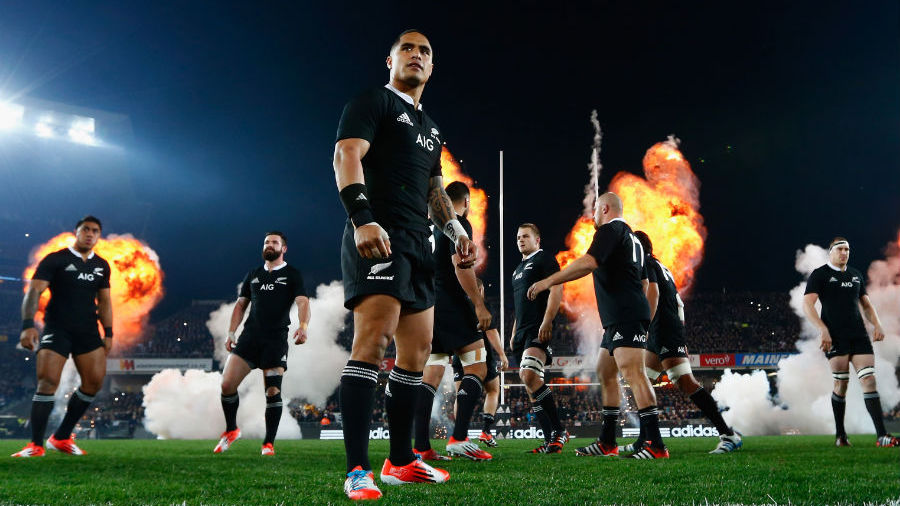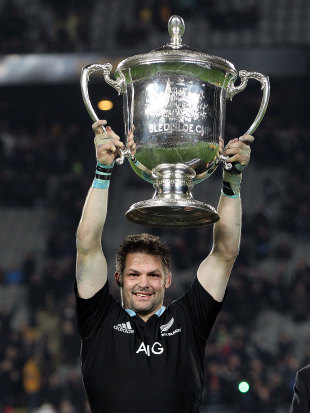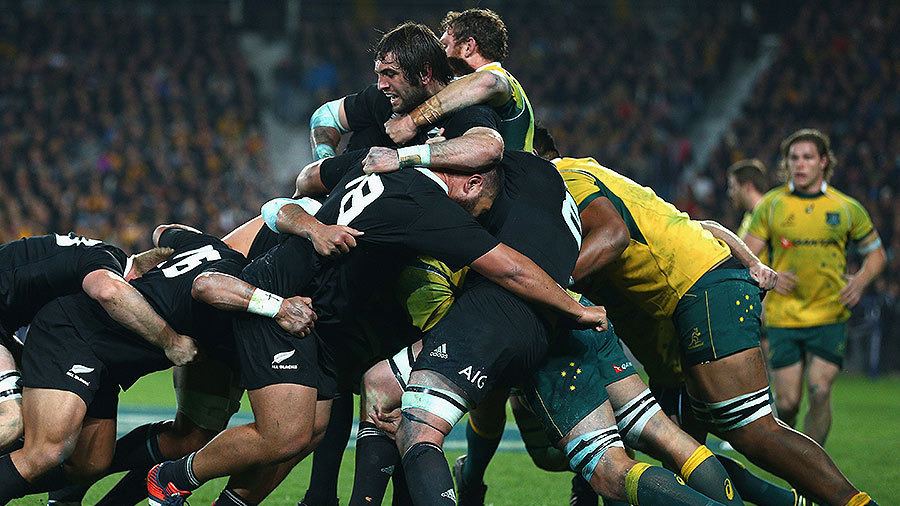|
Scrum5
Wallabies defence 'embarrassingly feeble'
Brett McKay
August 25, 2014

Aaron Smith stared down the Wallabies after the haka © Getty Images
Enlarge
Another series, another year added to Australia's Bledisloe Cup drought. Was the draw in Sydney the true indication of this Wallabies team, or the anomaly? Was Eden Park a better measure or an extremely bad night at the office? Whatever the answers, the Bledisloe is no closer to needing an Australian citizenship application form. Here are the talking points from the Bledisloe Test in Auckland. Have your say via the comments below, or jump onto Twitter and tell the world using the #Scrum5 hashtag.
One passage that sums up a matchIt's the 57th minute. New Zealand are up 37-6, and have a real chance of declaring and sending the Wallabies in again, to borrow a parlance from our CricInfo colleagues. An innings defeat looked in the offing. The Wallabies picked up some loose ball after a rare All Blacks mistake on attack. Kurtley Beale took the ball infield, found replacement Scott Higginbotham on the inside, and he popped a pass from the ground after making good metres. Fellow replacement Bernard Foley headed to the right, and the Wallabies had attackers set wide. Foley ended up playing to lock Sam Carter on his inside, and Carter took another five metres up field. From the next phase, Foley kept going right down the now short side and took the ball into contact, something we'd not see a lot of from the Australian playmakers to that point. The Wallabies went back to the left on the next phase, and replacement hooker James Hanson dropped the ball cold. No Wallabies were nearby, and the All Blacks piled over the ball and secured the turnover. At the back of the ruck, hooker Dane Coles looked up. He picked the ball up and darted left, looking initially like he'd pick and drive. But he didn't go to ground. He kicked it. Dane Coles. He had Julian Savea on his outside, and sensing a chance, kicked ahead to give his big winger something to chase. Not Aaron Smith. Not even Ben Smith. Dane Coles. A hooker. Savea very nearly beat Foley to the ball, but regardless it's contested ball. The Wallabies had two other players coming into the frame, and Savea was the only New Zealander on hand. Wallabies prop Sekope Kepu knocked the ball back further in attempting to take possession. Adam Ashley-Cooper went back 10 metres to clean up, but knocked on as Savea claimed him. The Wallabies had lost well over 50 metres now, and Savea was still the only All Black. Ashley-Cooper batted the loose ball back another five metres, Kepu picked up as Savea grabbed his leg, and as Pat McCabe slides in to try and clean up at the same time. McCabe tackled Kepu. That's not a typo. In the act of sliding in, McCabe's arms wrapped around Kepu's legs and brought his prop to ground. Suddenly Kepu is surrounded by black jerseys. Other Wallabies do get around Kepu somehow and prevent the turnover, and Foley puts the ball into touch from behind his try line. The Wallabies gave up more than 70 metres in 40 seconds of the most comical rugby I can remember in recent years - 40 seconds that summed up the performance of both teams so well. It's not important, but I will mention that the All Blacks scored three phases, a penalty, and a nine-man lineout later. The two teams could not have been any further apart at that point in the game.
New Zealand 51-20 Australia (Australia only)
Early yellow cards in a Test Match - a line in the sand?In the 13th minute of the match - and with the contest still very even - something happened that Australian fans and, indeed, fans of many nationalities thought they'd never see with their own eyes. Richie McCaw was yellow-carded for a cynical ruck infringement. At Eden Park! I had to go outside and check for flying pigs and unicorns. I jest, of course, but you get the sentiment. The All Blacks' recent discipline issues had been raised after the Sydney Test, in which they conceded two yellows after seven in their previous 10 Tests. As I mentioned last week, New Zealand coach Steve Hanson didn't give the answer of a concerned man. But here was McCaw pinged on his own 22 for playing the ball on the ground. There might be a fair argument that he was hard done by, but that won't change history. "I don't believe it," Gordon Bray said on Network Ten's coverage in Australia. "Hallelujah!" proclaimed Fox Sports commentator and former Wallabies captain Phil Kearns. Former international referee Jonathan Kaplan was quoted in the press last week saying his colleagues were tiring of New Zealand's defensive ruck tactics, and it certainly did appear that Kaplan's words had meaning as Romain Poite held the card aloft. Not three minutes later, Wallabies scrum-half Nic White was lucky to stay on the field after interfering with play from an offside position. And just as McCaw was readying himself to come back on, Wallabies lock Rob Simmons copped the yellow for illegal actions defending an All Blacks maul on his own 22. It was an interesting passage. Not unlike Craig Joubert's decision to issue a yellow in the opening minutes of a Super Rugby final a month ago, this really did look like referees had decided enough was enough. Fair enough, too. We complain about the lack of yellow cards so often, that it's only fair we should give credit when referees do take a stand. Let's hope there's more of it. Poite had an excellent match in charge. Once he had declared his benchmark, both sides got on with their respective games; New Zealand's being handing out a thumping, and Australia's being... well, whatever you want to call it. 
New Zealand's Richie McCaw lifts the Bledisloe Cup
© Getty Images
Enlarge
New Zealand secures the Bledisloe in styleAfter the initial opening quarter in which both teams took their time to get into the game, the fixture quickly became one-sided. The All Blacks won a penalty try after bulldozing the seven-man Wallabies scrum while Simmons was off the field, and they quickly went into domination mode shortly thereafter. To be frank, they had a fair bit of assistance. The Wallabies' defence in the 20 minutes into half-time was, at times, passive at best and absolutely, embarrassingly feeble at its worst. They certainly weren't on their own, but some efforts from Kepu and Wycliff Palu stick in the mind for their sheer laziness while fly-half Kurtley Beale for the most part made Quade Cooper look like Willie Ofahengaue. Turnstiles offer more resistance than some of the Australian defenders in that period, and they were incredibly lucky to be just the 17 points down at the break. The All Blacks ticked all the boxes: rock solid scrum - tick. Counter attack on a whim - tick. Lineout-into-rolling-maul-into-try? Tick and tick. I'll admit to having concerns about the New Zealand midfield last week, and what kind of attack it might produce. But it just didn't matter. Besides, for all their defensive organisational qualities, both Ryan Crotty and Conrad Smith gave so many reminders of their worth as counter-attacking link men that it didn't matter that the All Blacks didn't really attack with the backline from phase play. The way the Wallabies coughed up ball, they never had to wait long to counter anyway. 
New Zealand and Sam Whitelock dominated the forwards play to lay the platform © Getty Images
Enlarge
The Wallabies were their own worst enemy - againIt was deja vu on the error front for the Wallabies, only they took last week's display to worrying new depths in Auckland: unforced errors, ill-discipline, the poor decision-making and taking; it was all there again, only worse. Our stats had the Wallabies missing 22 tackles to the All Blacks' 10; tackling at 83% effectiveness to 92%. We had the Wallabies down for 18 turnovers, yet it felt like they made that many handling errors alone. The Wallabies had no answer for the All Blacks' broken-field play; none. It's actually fair to question whether the New Zealand counter-attack caused the Wallabies defence to implode, or whether the Wallabies' inability to present a unified line of defence invited the All Blacks to run to wherever the space was. If we hadn't seen this all before, we might be concerned. But Australian rugby fans have seen this all before. And concern doesn't even begin to describe the feeling two days later. That was a real "two steps back" loss. Ewen McKenzie's biggest challenge as Wallabies coach may still be ahead of him.
Steve Hansen was right about likely improvementThe All Blacks coach raised a few eyebrows in the build-up, when he suggested that his side had significant improvement in them from the first Bledisloe Test in Sydney but wondered how much improvement - if any - the Wallabies had in them. But he was right. New Zealand were significantly better in just about every aspect of the game, and it's a reasonable argument at the moment as to whether the Wallabies might even have regressed. By the midpoint of the second half, the All Blacks were toying with the Wallabies. They set up a nine-man lineout on the Australian line, dropped straight into a rolling maul, and steamed over like the proverbial freight train with McCaw, the conductor, grounding the ball at the back. Six minutes later, we got the second verse, same as the first. Nine in the lineout, throw to the back, drop into rolling maul, only this time Savea and Malakai Fekitoa stood back from the maul and started celebrating early. It was a major statement: "we know you know this is coming, but we'll still get there as easy as last time." And with fewer bodies attached. Because they could. Forget all the talk about aging bodies and great players slowing down. The All Blacks are still the benchmark in world rugby, and will be for some time yet. © ESPN Sports Media Ltd
|
Live Sports
Communication error please reload the page.
-
Football
-
Cricket
-
Rugby
-
- Days
- Hrs
- Mins
- Secs
F1 - Abu Dhabi GP
Abu Dhabi Grand Prix December 11-131. Max Verstappen ()
2. Valtteri Bottas (Mercedes)
3. Lewis Hamilton (Mercedes)
4. Alexander Albon ()
5. Lando Norris ()
6. Carlos Sainz Jr ()
-
ESPNOtherLive >>
Golf - Houston Open
Snooker - China Open
Tennis - Miami Open

